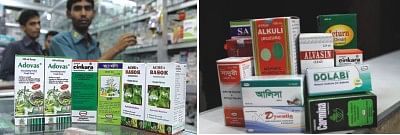Herbal drugs make a niche

Leading drug makers in Bangladesh are setting up plants to make herbal medicines. Photo: Amran Hossain
Herbs and plants have been used in many parts of the world for medicinal purposes for millenniums. But use of herbal cures began declining since early 19th century when chemical analyses were introduced and scientists started extracting and modifying the active ingredients of herbs and plants.
Later, chemists developed their personalised versions of various plant compounds and over time, the use of herbal medicine diminished even further.
In recent times, herbal medicines once again made a comeback in many countries including developed ones, as improvements in analysis and quality control along with advances in clinical research have proven the value of herbal medicine in treating and preventing diseases.
In many countries, herbal medicine is taken as food or herbal supplements, as their side effects proved to be next to nothing.
Bangladesh also looks forward to developing the herbal medicine sector, although uses of traditional medicine in the country have a long history, demographically as well as geographically.
Many of the Bangladeshi drug manufacturers today, including the top market players, are setting up separate units for herbal medicine, thus making the entrepreneurs' investment portfolio heavier. Herbal medicine was recognised as the fifth medicinal system in 2005 after the allopathic, homeopathic, ayurvedic and unani healing systems.
Plant's seeds, berries, roots, leaves, bark or flowers are generally used for preparing herbal medicines. In other words, if the main ingredient is derived from herbs, the cure will fall under herbal medicine. It is being mainstreamed gradually, as people are relying more and more on herbal medicines.
A recent survey of the World Health Organisation (WHO) said 80 percent of the world population today rely on traditional medicine for their primary healthcare and remedies, and the use of traditional medicine is rising in the developed economies such as Europe and the Americas.
The WHO categorised the herbal medicines into four types: traditionally used medicines; ayurvedic, unani and siddha that are very popular in the southeast region; modified herbal medicine; and modern and imported herbal medicine.
There are 17 licensed drug manufacturers in the country for producing herbal medicines. Square Herbal and Nutraceuticals, an endeavour of Square Group, is a pioneer in this sector.
Other licensed companies are Acme Laboratories, Modern Herbal Pharmaceuticals, Drug International and Hamdard Laboratories (Waqf) Bangladesh.
“The herbal medicine market is huge -- both locally and internationally. The global herbal medicine market is growing at 15-20 percent every year -- the highest growth is being seen in the US and Germany,” said MM Asad Ullah, group product manager of Square.
“Earlier, the least developed countries were our main focus for export. But now we want to enter the US and EU markets, as herbal medicines are growing to be quite popular there,” he said.
“We are focusing on manufacturing modified herbal medicines, including modern and imported herbal ones,” he said.
The herbs those are being used as traditional medicine but were modified with the help of science are modified herbal medicine. And if the worldwide accepted herbs are imported and used for producing medicine, these will fall in the category of modern and imported herbal medicine.
New entrepreneurial avenues for herbal medicine have been opened up as many investors are looking for venturing into making such medicines. Officials at the drug regulators' office said they have received many applications seeking approval to manufacture herbal medicine.
Industry people said the global market for medicinal plant products is estimated to be more than $60 billion a year.
At present, China and India meet bulk of the plant drugs' demand in the global market.
The industry people said the allopathic pharma market in Bangladesh is worth around Tk 4,000 crore, while the market size for herbal medicines including ayurvedic and unani may stand somewhere between Tk 1,000 crore and Tk 1,500 crore.
They observed scope to exploit the untapped herbal medicine market now lures investors to the segment with most applications coming from new investors along with allopathic drug makers.
The herbal medicine sector also received a further boost as the government termed herbs and herbal medicine as one of the five priority sectors to diversify the country's export basket.
The industry insiders said Bangladesh has good prospect of making its niche in the global market for medicinal plant and products as nearly 650 medicinal plant species have been identified to be in use in the country with around 25 plants of high value.

 For all latest news, follow The Daily Star's Google News channel.
For all latest news, follow The Daily Star's Google News channel. 



Comments